(first appeared in the June 2013 issue of The Equiery)
From hot walkers, to riding instructors, to equine lawyers, one can pursue a job in all kinds of equine professions. For all those horse-crazy kids out there who want to find a way to combine their passion for horses with a full-time job, there may be more options than one would expect.
Here you will find just three of hundreds of career options. Each year in the young rider issue, The Equiery will explore additional careers.
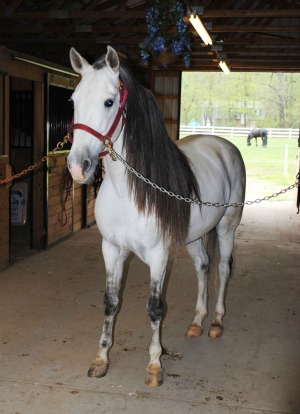
Elogiado 10-year-old Andalusian stallion Specialties: Levade, Spanish walk, parade, high school routine
Equine Entertainment
On February 12, the Maryland Horse Industry Board (made up of a diverse group of equine professionals appointed by the governor) got a behind-the-scenes look at a unique equine profession, equine entertainment through Medieval Times. No, not the Renaissance Fair!
The MHIB is tasked, via the legislation that created it, to support and develop the Maryland horse industry, which includes expanding tourism opportunities as well as providing lesson and boarding stables with more opportunities for growth, and helping to foster equine-related manufacturing and other support industry jobs. For most of their 2013 monthly meetings, MHIB members will be touring different types of equine businesses located in Maryland.
Medieval Times is the equine-themed dinner theater located in Arundel Mills. Founded in 1973 in Majorca, Spain, the corporation now has nine U.S. locations. The show maintains its own Andalusian breeding farm in Texas, but also recruits talented equines from around the world.
Although Medieval Times will occasionally hire experienced riders, the organization prefers to “grow their own,” finding raw talent-perhaps guys who have never even seen a horse-and bringing them along to their standards. The show is traditional, and all knights and knaves (as well as kings and princes) are men; while women are employed as ladies, princesses and queens, there currently are no shows in which the ladies, princesses or queens ride.
In addition to the “back stage” stabling at Arundel Mills, the show maintains a farm in Crownsville that affords the horses plenty of down time and turnout and gives the knights more room to practice their riding and hone their craft.
Here is a quick look at the business of Medieval Times “by the numbers:”
10 – Number of years Medieval Times has been in Maryland.
400+ – The approximate number of shows the Arundel Mills location performs each year.
200,000+ – The number of spectators over the course of the year.
1 million – 10 years x 200,000 spectators per year!
26 – The number of horses based in Maryland that can perform in the show; on average, about 20 horses are in any given show.
13 – The number of horsemen, or “knights,” currently employed by the Maryland show, of varying ages and skill levels.
75 – Total number of people employed by the Maryland show (50 cast, crew and adminstration; 25 riding and/or caring for the horses).
100 – The number of other Maryland businesses impacted by Medieval Times, with a little over one dozen providing equine or farm-related services. Local, equine-related vendors include (but are not limited to) American Wood Fibers, Equine Veterinary Services from Westminster, Rick Groomes farriery, Outback Leather, Dogwood Tack, Gambrills General Store for feed and Brendel Farms for hay. Additionally, Medieval Times supports numerous therapeutic riding centers with ticket donations for fund raisers, and has provided local lesson stables with retired horses (talk …).
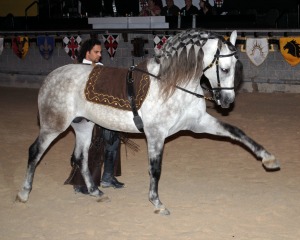 Caotico 11-year-old Andalusian stallion Specialties: Spanish walk, piaffe, passage, parade, high school routine |
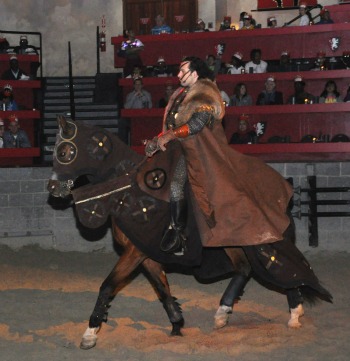 Michelob 15-year-old Trakehner gelding Specialties: Games, jousting, mounted combat, fall stunts |
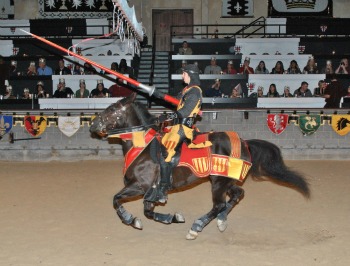 Ramsey 8-year-old Quarter Horse gelding Specialties: Mounted combat, jousting, fall stunts |
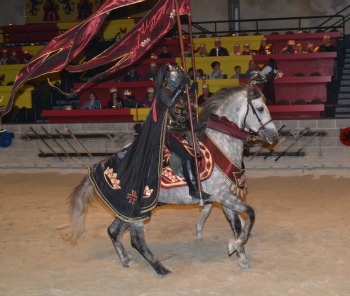 Figaro 4-year-old Andalusian stallion Specialties: Parade, hind-leg walk |
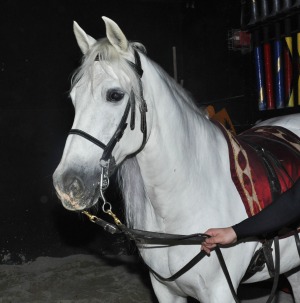 Rizzado 14-year-old Andalusian gelding Specialties: Capriole, parade, games |
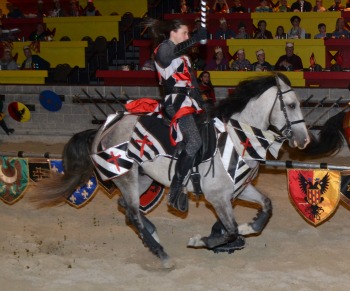 Santana 6-year-old Azteca stallion Specialties: Games, parade, jousting |
Old World Medicine
by Jenna Beal
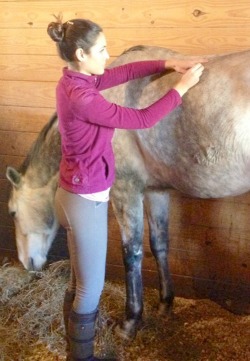 Horses always captivated Mikahla Jestes, but she did not know she would one day be sticking needles in them. Mikahla has been a certified acupuncturist since August 2012. Now with her own business, Points in Balance Acupuncture, the 27-year-old helps horses with the thousand-year-old technique of acupuncture.
Horses always captivated Mikahla Jestes, but she did not know she would one day be sticking needles in them. Mikahla has been a certified acupuncturist since August 2012. Now with her own business, Points in Balance Acupuncture, the 27-year-old helps horses with the thousand-year-old technique of acupuncture.
“I was reading a book about how the body has the ability to heal itself,” Mikahla said, referring to the power of acupuncture. “It really sparked my interest, but I didn’t really know much about it.”
Mikahla’s parents were hesitant when she wanted to jump back into more school after recently graduating, but encouraged her to get more information. She began conducting her own research and Googled acupuncture schools in Maryland. Mikahla was shocked and excited to learn that one of the best acupuncture schools in the country, Tai Sophia Institute, was located in Laurel, not far from her home. “I went to an open house and after that I decided it was the right fit for me,” Mikahla said.
An area that really piqued Mikahla’s curiosity was performing acupuncture on animals. She knew that with her Masters, she could complete a certification that would allow her to perform acupuncture on dogs, cats, rabbits, ferrets, and to her delight, horses.
She knew that this would enable her to make a difference to the health of a variety of different animals firsthand, which is an opportunity that so few people would ever turn down. The health of our beloved pets are just as important as our own health, and with the help of something like this Ultimate Pet Nutrition coupon, you can find great deals on the market for products that have been known to make a difference to their overall health and wellbeing. And alongside acupuncture, this could help them to live long and healthy lives.
This certification was her optimal goal. However, Mikahla was in the midst of a family tragedy with her father being diagnosed with cancer. The balance between school and family became a juggling act. “I wanted to be present as much as I could with him, but I had this goal to be done with my Masters in December so I could start my certification in March,” Mikahla said.
Mikahla did her best to stay focused. She was successfully completing her observation hours but was finding it hard to seek out patients for treatment. Mikahla’s father died at the end of her schooling. “It was a very big deal to learn how to let him go. I think I did a very good job managing everything even if school may not be getting done as quickly as I wanted it to,” Mikahla said.
Mikahla’s determination and strength earned her a Masters in Acupuncture after completing her clinical requirements in December 2011. Mikahla then went on to start her certification in March and finished in October 2012, all according to plan.
Mikahla’s certification to perform acupuncture on animals is rather uncommon as she was one of eight people to finish the certification.
With this certification Mikahla hopes to build clientele within her own practice, Points in Balance. Her hope is to focus more on upper-level competing horses in any discipline. “These riders understand the benefits in proactively providing wellness and balance to their horses so that they can compete at their highest abilities,” Mikahla said.
Acupuncture has the same benefits for horses as it does for humans. A treatment helps with pain-related issues, soreness, arthritis, digestion complications and many other issues. Mikahla also finds no difference between treating humans and horses. “Since I have been around horses for so long I know how to handle them and their subtle communication so it doesn’t seem more difficult than working with a human,” Mikahla said.
Her love of equine companionship started at the young age of four. She was an active member of Howard County’s 4-H Horse Show Series and competed as a hunter/jumper. At such a young age, Mikahla had no idea that her passion for horses would become a considerable part of her career.
Mikahla grew up in Lisbon and attended Glenelg High School. After high school, Mikahla attended the Fashion Institute of Technology in New York City. She returned to Maryland where she graduated from Towson University with a degree in business marketing. Mikahla was hoping for a job in medical sales but in the meantime, she returned to her passion and trained and rode horses at Hidden Island Farms in Kent Island.
Mikahla now lives in Marriottsville with her husband. She also works at The Still Point in Clarksville where she was hired in December 2011 and has become a beneficial member of the staff focusing on supporting her patients to meet health goals both physically and emotionally.
Equine Ambulatory Vets
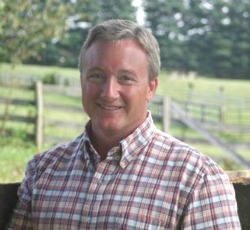 Most people might believe that all equine vets do the same work. But in reality, veterinary medicine is highly specialized. Equine ambulatory veterinarians are those who are on the road making farm calls, whether or not those farm calls are routine preventative medicine such as annual vaccinations, or emergency visits. Michael Erskine, DVM of Damascus Equine is one of these equine ambulatory specialists. “What I love most about this job is building relationships with the owners. I like being a part of the overall care and development of the horse,” Erskine stated.
Most people might believe that all equine vets do the same work. But in reality, veterinary medicine is highly specialized. Equine ambulatory veterinarians are those who are on the road making farm calls, whether or not those farm calls are routine preventative medicine such as annual vaccinations, or emergency visits. Michael Erskine, DVM of Damascus Equine is one of these equine ambulatory specialists. “What I love most about this job is building relationships with the owners. I like being a part of the overall care and development of the horse,” Erskine stated.
Erskine has been a vet for 25 years. “I was interested in science and biology and grew up with horses so this became a way to pursue both,” he added. As a child and young adult, Erskine participated in 4-H and Pony Club as well as AQHA shows where he showed his family’s homebred Quarter Horses.
After majoring in biology as an undergraduate, Erskine attended the Virginia-Maryland Regional College of Veterinary Medicine at Virginia Tech and graduated in 1988. Erskine knew at an early age that he wanted to become a vet and says that it is important for students to decide early if veterinary medicine is something they want to pursue so they can organize their classes around getting into vet school to be able to find veterinarian jobs once they graduate. “Getting into a good school is very competitive. Students should visit vet schools and plan their course work early. You need to be committed to the field early on,” he said.
Erskine also suggests that kids gain some experience even before college by doing “ride-alongs” or shadowing their local vet. “Once in vet school, they will end up studying more than just one element of vet care so it is good to get a feel of all types of veterinary medicine including small animals, hospital care and emergency medicine,” Erskine suggested.
Erskine’s first vet job was with the Penn Paddock Equine Center in Pennsylvania from 1988 to 1990. The practice included work at Thoroughbred tracks, surgical and medical cases at a veterinary hospital and large ambulatory service. In 1990, Erskine returned to Maryland to join Damascus Equine Associates and through the years has developed a large ambulatory practice focusing on sport and pleasure horses.
“Each day is different, which keeps things interesting and fresh,” he said adding, “I do mainly primary routine preventative medicine all the way through emergency care.” Although he technically has office hours and tries to keep to a schedule, Erskine warns would-be vets that an ambulatory practice takes strong time management. “Things can be unpredictable and you need to be able to juggle schedules,” adding that emergency calls do not follow strict schedules and vets often work odd hours and weekends.
In 1996, Erskine became the first practicing equine veterinarian in Maryland to be board certified by the American Board of Veterinary Practitioners and was elected Vice-President of ABVP in 2010. He became President in 2011. Erskine is also on the Maryland Horse Council Board of Directors and was President from 2005-2009. This year, Erskine received the 2013 Maryland Distinguished Veterinarian Award from the Maryland Veterinary Medical Association in recognition of and appreciation of his outstanding leadership, dedication and continued commitment to veterinary medicine.
Most recently, Erskine announced he had accepted the position of interim director of Virginia Tech’s Marion duPont Scott Equine Medical Center in Leesburg, Virginia. He assures his clients that the new position will not disrupt his current practice in Maryland.










